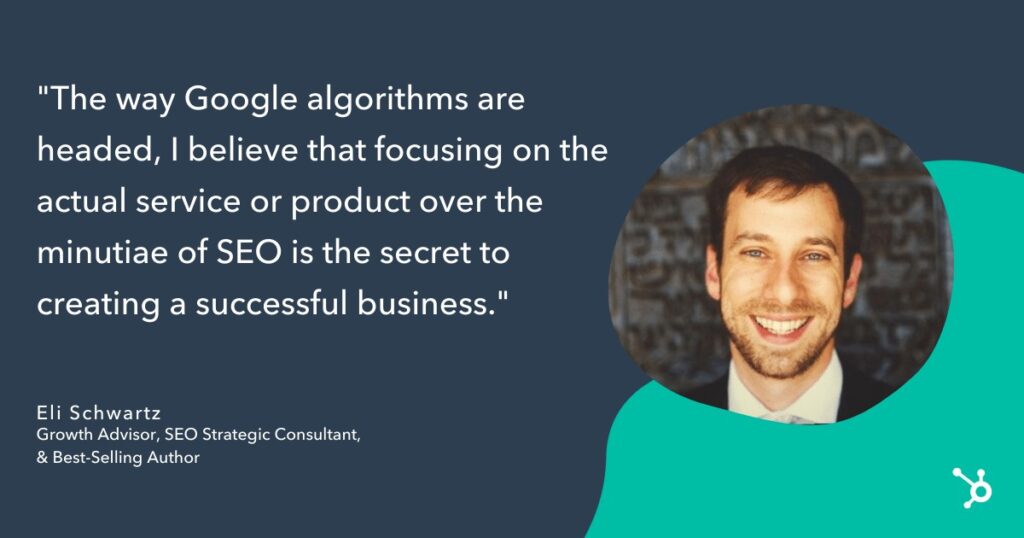If you're working in digital marketing for a business with an online presence (which, let's be real, is most businesses these days), there's a good chance that you live in dread of the infamous "Google algorithm update."
Many marketers see this periodic switch-up in Google's algorithm as a lurking nemesis out to slash their metrics and banish traffic.
The typical response? Every time Google comes out with an algorithm update, SEO specialists and thought leaders try to decode and decipher the algorithm's secrets to find out what makes it tick. The idea is that, if you can figure it out, you can reorganize your SEO and content strategy to regain (or surpass) your pre-algorithm rankings.
This might seem like the best plan of attack. However, I believe this metrics-hungry, beat-the-algorithm mentality just ends up hurting companies in the long run. It's inefficient, it distracts from the true purpose of SEO, and it ultimately wastes your company's time and money.
My take? While algorithm updates shouldn't be minimized (because they can negatively effect businesses), they also shouldn't be feared. I believe we should work with the algorithms, not against them, ultimately creating a win-win: a better experience for users and a more successful web presence for deserving businesses.
Let's explore how to do that next.
Algorithm Updates Improve User Experience
Because the digital landscape is constantly changing, businesses have to accept that these algorithm updates aren't going anywhere. They are happening, and will continue to happen, indefinitely. And that is okay … and what we, as search engine customers, should want too!
The first step in working with Google algorithm updates is to understand why they happen in the first place. These updates are designed to create a better internet experience for both businesses and consumers.
The idea is to make browsers "smarter" so that internet users are able to find what they're looking for faster, and with less effort.
Sounds great in theory, right? Under this model, businesses find the right customers and vice versa. If it's an improvement for the user, it should be an improvement for you.
The problems start when we begin to analyze and crunch numbers after a post-algorithm-update …
Don't Get Caught Up In The Metrics Game
For many SEO managers, numbers are everything — total organic clicks, bounce rates, keyword rankings, impressions, the list goes on. And for good reason! This data helps us to understand what's going on on the other side of the screen.
However, when this data becomes the end goal, we get into trouble. A lot of times, from an SEO standpoint, there's a tunnel-vision focus on metrics and traffic, which leads to tilted strategies purely bent on maximizing the wrong numbers.
But, here's the thing — higher rankings on Google aren't necessarily great for business. Yes, they look great on a quarterly report. Yes, they're easy to track. But do impressions necessarily convert to leads? No. These numbers turn into a sort of meaningless trophy rather than a useful tool.
Let's take a look at an example to highlight what I mean.
Lower Traffic Could Mean Higher Revenue
Over a period of time, I worked with a business that had two sides to their site: user-generated content, and professionally-generated content. The user-generated content was produced in higher volumes, but also tended to be lower quality.
Every time there was an algorithm update, the user-generated side of their business was impacted negatively. They lost significant chunks of their traffic, time and time again. However, the company's overall revenue simultaneously increased.
Why? Because the other side of their business was benefiting. The high-quality, professionally-generated content was favored by the algorithm because it was closer to what internet users were actually looking for. Therefore, it benefitted when its lower-quality competitors were demoted.
To me, this is the perfect argument for why businesses should spend time creating a great product rather than putting a laser-focus on SEO hacks or metrics. If you create an effective website with relevant content, the clicks will come organically.
Stay Focused on the User
Ultimately, the solution sounds too good to be true — stay focused on who the user is and what the user wants to find on your site.
Rather than asking yourself, "Do we deserve to be #1 because we have the most keywords or the best backlinks?", ask yourself, "Are we the best solution for what the user would want? Do we deserve to be #3 from a user standpoint?"
The way Google algorithms are headed, I believe that focusing on the actual service or product over the minutiae of SEO is the secret to creating a successful business.
This is what I termed "Product-Led SEO" in my book with the same name. This approach upends the whole premise of marketing the product to promote adoption.

Instead, the shift focuses on getting a great product into the hands of users who get excited enough to become marketing agents on the product's behalf. In this paradigm, there may also be innate triggers within the product that encourage sharing, thereby forcing the hand of the user.
Algorithm Updates Aren't Your Enemy
In the end, Google Algorithm updates are a fact of life. The sooner everyone can accept this and learn to work with the updates, not against them, the sooner they will find successful strategies.
The key to "going with the flow" is to take a good, long look at which direction the water is going. And, from everything I've seen, the proverbial algorithmic river is flowing straight towards the direction of Product-Led SEO. In my opinion, every good SEO strategy will follow.
Start by talking to users. Get in touch with what your customers want. What are they looking for? What do they like? What makes them click on a CTA? What cues do they use to navigate a site? Once you have a good handle on the needs of the user, you can begin to create a site that naturally rises above the algorithmic chopping block.
When your site becomes more effective, and you are able to connect with the right customers, everyone wins. This is the whole point of algorithms, and finding the harmony between the two will help ease a lot of stress and boost business.


